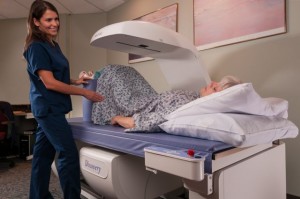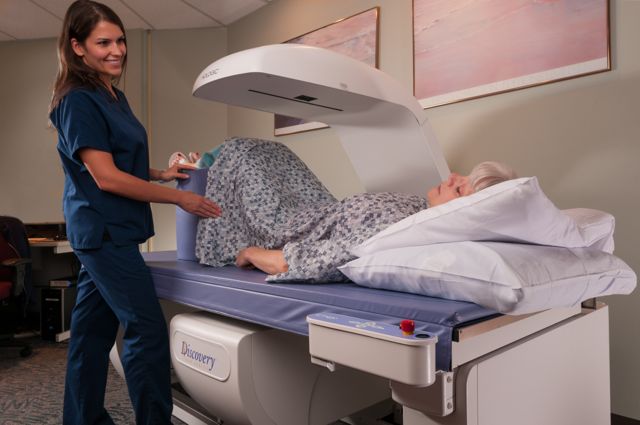Submitted by South Sound Radiology

No bones about it – DEXA scans help you take charge of your bone health
According to The National Osteoporosis Foundation, new data estimates that approximately nine million adults have osteoporosis and more than 48 million have low bone mass, placing them at increased risk for osteoporosis and broken bones. To help protect your bones, the U.S. Preventative Services Task Force recommends screening for osteoporosis in women 65 and over, and in younger women whose fracture risk is equal to or greater than that of a 65-year-old woman who has no additional risk factors.
A Bone Densitometry Scan, also known as a DEXA scan, is performed to determine a patient’s bone density. The results of this test can help determine if an individual is at risk for or has developed osteoporosis. Routinely performed at South Sound Radiology, a DEXA scan is a simple, non-invasive, painless test that requires about 15 minutes of lying on a table while the scanner works.
DEXA screens for osteoporosis, a disease that causes bones to become weak. Weak bones can lead to life-altering fractures, caused by anything from coughing to falls. Most of us know an individual whose retirement years were seriously altered or even cut short by a fracture caused by osteoporosis. Since women’s risk of developing the disease is much higher than men’s, women should consider cautionary screening before they suspect a problem.
If detected, there are some quality treatments for osteoporosis to help strengthen bone and prevent fractures. For that reason, it is very useful to undergo DEXA so you and your health care provider know to undertake preventative treatment.
Like annual screening mammograms, women can refer themselves for DEXA exams and do not need a doctor’s referral, although patients do need to have a qualified provider to send and review results.
Although it’s recommended that scans begin at 65 for all women, some providers believe bone density scanning should begin earlier, to determine a baseline for future screenings.
Who should have a DEXA scan?
- Women age 65+
- Women who are postmenopausal, under age 65, with one or more additional osteoporosis risk factors
- Women who are postmenopausal who have suffered fractures
- Women who either are or have been on hormone replacement or estrogen replacement therapy for prolonged periods of time
- Individuals previously diagnosed with osteoporosis who are currently being treated or are considering treatment
What will I experience during a DEXA scan?
- At the time of your appointment, a robe will be provided and you will be asked to remove any clothing or accessories that contain metal. The technologist will record your height and weight, and ask you a few screening questions.
- You will then be positioned on a padded exam table. Individual scans of your spine, one wrist and one hip will be obtained. During each scan, a camera will slowly move above you sending an invisible beam of very low-dose x-rays through the area being scanned. The amount of radiation exposure received during a DEXA scan is less than that received during a chest x-ray.
How should I prepare for the DEXA scan?
- It is important to take NO VITAMINS or CALCIUM supplements on the day of your exam.
- If possible, wear metal-free clothing and accessories. Avoid under-wire bras and metal fasteners such as zippers or buttons.
- Inform the technologist if you have any metal implants inside your body, have had any recent fractures, a recent nuclear medicine scan, or a barium enema.
- Inform the technologist if there is any possibility that you are pregnant.
How will I obtain results of my DEXA scan?
Special computer software is used to calculate your bone densitometry measurements. Following your scan, a radiologist will dictate a medical report for your clinician incorporating this data. After reviewing this report, you and your doctor can discuss the best strategy to maintain or improve your bone density.
What is Osteoporosis?
Osteoporosis is a condition in which bones have lost minerals – especially calcium – making them weaker, brittle, and more susceptible to painful fracture.
Certain factors are associated with an increased risk for the disease, including:
- Being female (however, a small percentage of men are also at risk)
- Advanced age
- Estrogen deficiency (e.g., following menopause in women)
- Personal history of fracture after age 50
- Caucasian race (however, people from all ethnic groups suffer from osteoporosis)
- Low body weight and body mass index
- Family history of osteoporosis
- Smoking
- Excessive use of alcohol
- A diet low in calcium
- An inactive life style with little or no exercise
- Thyroid disease
- Use of certain medications ( i.e.: steroids, anti-convulsants, excessive thyroid hormone, certain cancer treatments, heparin therapy)
To request a DEXA scan at South Sound Radiology, you may call 360-493-4646 and speak with one of our staff members who will be happy to schedule an appointment for you.
*Reminder: No clinical order is required for the DEXA scan, but we will need the name of your clinician to whom we can send a report. You clinician will then be able to discuss the results with you.
For more information about South Sound Radiology, please visit www.SouthSoundRadiology.com.

















































